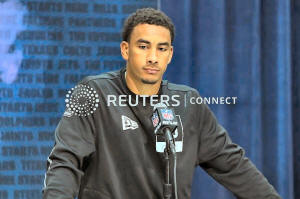Take 5: Packers bet big, AFC West
goes wild
 Send a link to a friend
Send a link to a friend
 [April 24, 2020]
In what felt like one of the
more unpredictable drafts in years, the first round Thursday night
actually began mostly chalk. [April 24, 2020]
In what felt like one of the
more unpredictable drafts in years, the first round Thursday night
actually began mostly chalk.
However, the variability picked up shortly outside the top 10, with
some surprises in the deep receiver and cornerback classes, and then
flourished with a stunning trade up by the Green Bay Packers to grab
Aaron Rodgers' heir apparent.
That's where we'll begin with Round 1's biggest takeaways.
1. Boldest teams: Packers and 49ers
The Packers have obviously been here before, with Aaron Rodgers
arriving to succeed Brett Favre, but that doesn't mean the trade-up
for Utah State's Jordan Love will work out.
With incredible talent but ghastly decision-making, Love might be
the biggest risk in the draft. Green Bay is a great landing spot for
him because he now has time to develop, but does that justify the
Packers' gamble?
I'm not so sure. Rodgers needs more weapons, and Green Bay's defense
needs reinforcements after being overrun in last year's NFC
Championship Game. Instead, the Packers' best asset (and a
fourth-round pick traded away) won't pay any dividends at least two
to three years, and Rodgers gets less support in the back end of his
career.

If Love delivers, the Packers might have secured sustained success
at quarterback for a span of four to five decades, dating to Favre's
arrival. If he busts, things will get awfully ugly. The stakes are
sky high.
Meanwhile, the team that stomped Green Bay for the NFC title, the
San Francisco 49ers, also bet big.
With two first-rounders but no other picks until Round 5, the Niners
moved down from No. 13 to No. 14, adding a fourth-rounder and taking
South Carolina defensive tackle Javon Kinlaw to replace DeForest
Buckner. But San Francisco quickly gave away that pick, and a
fifth-rounder (No. 176), to move up six spots at the bottom of Round
1 for Arizona State wideout Brandon Aiyuk.
Kinlaw and Aiyuk are bold choices, too, as incredibly talented but
raw players. Kinlaw might be a Chris Jones clone, but he's
unpolished and undisciplined against the run. Aiyuk fits Kyle
Shanahan's offense with after-the-catch prowess, but he's a raw
route-runner. The 49ers could have nabbed a more polished (and
arguably better) duo by taking CeeDee Lamb at No. 14 and Ross
Blacklock at No. 31 (with no trade-up) instead.
Teams with stacked rosters can afford to take risks, and the Niners
certainly swung for the fences. But having fewer picks means you
have to hit.
2. AFC West goes wild
Jockeying for divisional position after 7-9 campaigns, the Las Vegas
Raiders and Denver Broncos both needed receiving help. The Raiders
had better draft position (thanks to a two-point conversion failure
at Denver in Week 17), but did they maximize it?
At No. 12, Las Vegas took Alabama's Henry Ruggs, the blazing-fast
but less productive teammate of Jerry Jeudy, one of the best
route-runners in recent memory. Jeudy surprisingly slipped to No.
15, where Denver snapped up arguably the steal of Round 1 and a
perfect complement to Courtland Sutton.
Ruggs is an underrated route-runner and clearly more than a speed
threat, but he has a long way to go to become Tyreek Hill or DeSean
Jackson. Jeudy's timed speed (4.45-second 40-yard dash) can't match
Ruggs' (4.27), but the gap in play speed is much smaller, and Jeudy
repeatedly won vertically in college. Jeudy also appears more agile
laterally, and his bag of tricks is deeper than Santa's sack.

Meanwhile, after Denver got tremendous value in Jeudy, Las Vegas
followed four picks later with one of the biggest reaches of Round
1, taking Ohio State cornerback Damon Arnette at No. 19 when most
had him pegged for Round 2 or 3. It felt as if Al Davis were running
the Raiders' war room again.
Those were hardly the only fireworks in the division, with the Los
Angeles Chargers adding two major talents and the Kansas City
Chiefs' offense getting more dangerous. More on both of those below.
3. Other winners: Cardinals, Vikings
It wasn't surprising to see Clemson's Isaiah Simmons -- a unique
defensive weapon built for today's NFL -- slip a tad. The top six
featured three quarterback-needy teams, a generational pass-rusher
and two teams (Detroit Lions, New York Giants) with obvious needs to
fill elsewhere.
The Carolina Panthers passing at No. 7 is harder to explain (see
below), but the Arizona Cardinals capitalized, nabbing a supersized
version of Derwin James. Coordinator Vance Joseph's scheme isn't
overly creative, but he mixes personnel well, and Simmons will be a
weapon in all sorts of roles depending on the situation.
[to top of second column] |

Utah State quarterback Jordan Love speaks to the media during the
NFL Combine at the Indiana Convention Center. Brian Spurlock-USA
TODAY Sports

Perhaps even bigger winners were the Minnesota Vikings, who might
have gotten the most value of any team in Round 1. LSU wideout
Justin Jefferson could have gone as high as No. 13, and the Vikings
could have panicked and traded up in front of Philadelphia at No.
21. Instead, they got him at No. 22.
Then Minnesota capitalized on the 49ers' aggressiveness, adding
fourth- and fifth-round picks to move down six spots. The Vikings
still got a much-needed cornerback in TCU's Jeff Gladney, a speedy,
ultra-competitive cover man who fits perfectly in Mike Zimmer's
defense.
4. Other losers: Panthers, Chargers
Derrick Brown should be a very good player for the Panthers, but
picking him over Simmons was a major question mark. Brown is a
dominant run defender but a solid-not-standout pass rusher. He
relied heavily on power in college, which won't always be enough in
the pros.
Brown likely won't bust, but it's very possible he tops out as
merely a plugger and pocket pusher. That would be especially
disappointing if Simmons, practically born to thwart modern passing
attacks, delivers on his potential.
On the other end of the spectrum, the Chargers added a ton of
upside, but I'm far from sold on their picks. Oregon quarterback
Justin Herbert and Oklahoma linebacker Kenneth Murray are physical
marvels, but they both have questionable instincts.
Herbert is brilliant, but he doesn't process as quickly as you'd
expect for a four-year starter, and his elite physical tools rarely
translate to off-schedule playmaking as you'd hope. Meanwhile,
Murray's tape is littered with false steps, and while he's fast, he
rarely shouldered much of a coverage burden.

With the Dolphins staying put at No. 5, the Chargers could have
stolen Alabama's Tua Tagovailoa instead of Herbert with a small
trade-up. Instead, they took Herbert and gave up a third-rounder to
trade up for Murray. That's just too risky in my book, especially if
those players' instincts don't develop quickly.
5. Other great fits
A few other picks Thursday night really stood out as ideal fits,
regardless of the value on the draft board.
Chase Young (Washington Redskins) and Jeff Okudah (Detroit Lions)
were not surprises, but Young is ideal for Ron Rivera's zone-based
defense, and Okudah likewise is tailor-made for Matt Patricia's
man-heavy scheme.
The Cleveland Browns might have preferred a college left tackle
(Georgia's Andrew Thomas) to Alabama's Jedrick Wills, but Wills'
transition from the right side to the left should be smooth. Not
only is his position coach the renowned Bill Callahan, but legendary
blind-side blocker Joe Thomas has pledged to help Wills. Oh, and
Wills will play next to a rock solid left guard, Joel Bitonio.
Iowa's Tristan Wirfs won't have to switch sides in Tampa Bay. He
slots straight in at right tackle for the Buccaneers, filling their
biggest need with a great value and high upside.
Some pegged TCU wideout Jalen Reagor as a reach at No. 21, but he is
absolutely electric, bringing much needed explosion to Philadelphia.
He can play outside but will be weaponized in the Eagles' offense,
with more work in the slot and myriad gadget plays. Reagor also
attacks jump balls with rare fearlessness for a 5-foot-11 guy.
LSU linebacker Patrick Queen isn't a banger, but that's the only
real hole in his game. He'll stay clean behind the Baltimore Ravens'
beefy D-line, free to trust his instincts and fly sideline to
sideline. He's also a terrific blitzer and sharp as a zone-match
cover man, both key parts of Baltimore's scheme.
The defending Super Bowl-champion Chiefs made the league's best
offense even better with LSU's Clyde Edwards-Helaire, an undersized,
stocky back with terrific agility, sharp receiving skills and
underrated power. If that sounds familiar, it should -- Edwards-Helaire
is awfully reminiscent of Brian Westbrook, one of Andy Reid's best
weapons during his time in Philadelphia.
--By David DeChant (@DavidDeChant), Field Level Media
[© 2020 Thomson Reuters. All rights
reserved.] Copyright 2020 Reuters. All rights reserved. This material may not be published,
broadcast, rewritten or redistributed.
Thompson Reuters is solely responsible for this content.
 |